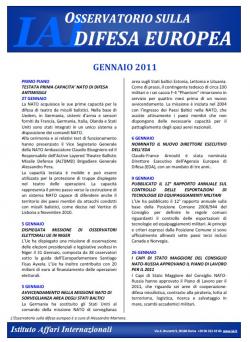Observatory on European defence, September 2009
September 4, 2009
FIRST MEETING ON NATO'S NEW STRATEGIC CONCEPT
The 12 experts appointed by NATO Secretary General Anders Fogh Rasmussen to lay the ground for NATO's New Strategic Concept met for the first time in Brussels. The group is led by former US Secretary of State Madeleine Albright.
September 9, 2009
FRENCH GENERAL TAKES OVER NATO ACT COMMAND
French General Stéphane Abrial has taken over as Supreme Allied Commander Transformation (SACT). Abrial's appointment follows France's decision to rejoin the NATO military command, announced at the summit held in April. ACT is responsible for the evolution of the Alliance's military structure, guidelines and capabilities. The Command is particularly involved in assuring the inter-operability and growing force-projection capacity of NATO troops.
September 15, 2009
EUSEC RD CONGO MANDATE EXTENDED
The EU General Affairs and External Relations Council decided to extend the mandate of the EU mission in the Democratic Republic of the Congo by one year. The mission's budget is set at EUR 10.9 million.
The EUSEC RD Congo mission, currently composed of some 50 people, was launched in 2007. The mission's purpose is to assist Congolese authorities in the reform of the security sector, develop a military organization capable of protecting civilians while implementing human rights, rule of law and democratic standards. EUSEC has assisted the Congolese government in taking a census of troops and distributing ID to the DRC's armed forces.
September 18, 2009
ANTI-MISSILE SHIELD IN EASTERN EUROPE SET ASIDE
US President Barack Obama has officially announced that the controversial project of an anti-missile shield to be installed in Poland and Czech Republic will be dropped. The system, aimed at protecting the US and European countries from threats coming from Iran, will be replaced by short and medium range missile interceptors based on AEGIS-equipped ships.
The plan to install anti-missile systems in Eastern Europe caused a much political friction with Russia, concerned about an alteration in the European strategic balance. The anti-missile system, promoted by the Bush administration without prior discussion with the allies, sparked debates within the EU and Atlantic alliance as well (many members considered it superfluous and feared negative effects on relations with Russia). In addition, the shield was opposed by a significant part of the US Congress because of its high costs and above all because its effectiveness was never proven.
September 21, 2009
AGREEMENT BETWEEN EU, NORVAY AND ICELAND ON TRANSBORDER COOPERATION
The Justice and Home Affairs Council approved the international agreement with Iceland and Norway to improve transborder cooperation, in particular in the fight against terrorism and international crime.
Iceland and Norway had previously asked to be associated to the EU's Police and Judicial cooperation structure. The Council decided that some of the agreement's provisions will become effective temporarily even before its ratification.
September 23, 2009
TURNOVER AT EDA
Javier Solana, as Head of the European Defense Agency, appointed Rob de Jong as President of the National Armaments Directors Steering Board, and Jean-Marc Denuel President of the Capability Directors Steering Board.The Steering Board, the Agency's main directive body, is composed of representatives of the 26 member countries and meets at ministerial level or sub-ministerial level (Armaments Directors, Capability Directors or R&T Directors).
September 30, 2009
AGREEMENT ON EU COMMITMENT IN SOMALIA
The informal meeting of EU defense ministers agreed on the need for broader action in reforming the security sector in Somalia in order to fight piracy in the Gulf of Aden and the Indian Ocean. Presently, France, Germany and Great Britain are conducting training programs as a part of NATO's Operation Ocean Shield.
-
Details
Roma, Istituto affari internazionali, 2009, 2p. -
Issue
09/09



